“Remembrance” – Star Trek: Picard S1E01
You must look inside, deeply and honestly. Have you ever considered the possibility that you are something lovingly and deliberately created?
—Jean-Luc Picard
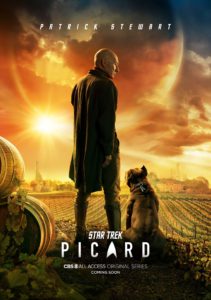 I’ve been waiting for this for a long time. As a fan of a great many TV series and sci-fi franchises, there are a multitude of characters that I love, buy their swag, post their gifs. But none of them hold a candle to Jean-Luc Picard for me. He was the captain who led the ship that first sent my love of story and adventure to warp nine. And while the other Star Trek captains are just fine, Picard is my captain.
I’ve been waiting for this for a long time. As a fan of a great many TV series and sci-fi franchises, there are a multitude of characters that I love, buy their swag, post their gifs. But none of them hold a candle to Jean-Luc Picard for me. He was the captain who led the ship that first sent my love of story and adventure to warp nine. And while the other Star Trek captains are just fine, Picard is my captain.
Upon first hearing of Picard’s pending return, I was apprehensive. After the first episode of his new series, I am delighted. “Remembrance” is an episode that carefully balances a lot of nostalgia (haters call that “fan service”) with a course plotted to a new future for Jean-Luc and Star Trek. With how delicately this series has interwoven some of the most influential moments and characters from the franchise’s history into its storyline, you can tell that whatever follows will be handled with care and reverence. I’m glad I don’t have to wait any longer.
Why Now for Jean-Luc Picard?
Bringing back the captain of The Next Generation could have been handled a multitude of ways. Picard could have been a supporting role in a new film, or simply a cameo in another series. So why center an entire new show around this character? We last saw him 18 years ago in a lackluster movie that seemed to signal a final bell for Star Trek proper. What makes him a captain for this generation?
 “Remembrance” already provides us some answers. The episode sets up a storyline for the season that will examine the value of life in all its forms; the Federation and Picard stand at odds over the Romulan Refugee crisis, with Starfleet having withdrawn its aid based on their tumultuous history and the threat from a group of synthetic terrorists. With a new ban on synthetic life, and the appearance of Dahj, we start to see the cost of these lines drawn.
“Remembrance” already provides us some answers. The episode sets up a storyline for the season that will examine the value of life in all its forms; the Federation and Picard stand at odds over the Romulan Refugee crisis, with Starfleet having withdrawn its aid based on their tumultuous history and the threat from a group of synthetic terrorists. With a new ban on synthetic life, and the appearance of Dahj, we start to see the cost of these lines drawn.
This thematic territory is nothing new in Star Trek, nor in sci-fi as a whole; and Jean-Luc Picard has been at the center of many of the franchise’s defining examinations of life. He has been a resolute defender of the rights of all living creatures, going so far as to disobey the orders of Starfleet to do so when necessary. I mean, he even represented humanity’s character when it was on trial by the immortal Q race and won. Safe to say, he’s a good guy.
Picard: The Romulans asked for our help, and I believed we had a profound obligation to give it to them.
Interviewer: Many thought there were better uses of our resources than aiding the Federation’s oldest enemy.
Picard: Well, fortunately the Federation chose to support the rescue efforts… (they) understood there were millions of lives at stake.
Interviewer: Romulan lives.
Picard: No… lives.
Star Trek: Picard seems to draw its story framework from two of Trek’s finest episodes dealing with these themes: “The Measure of a Man” (TNG Season 2, Episode 9) and “The Offspring” (TNG Season 3, Episode 16). In each episode Picard must defend the rights of synthetic life. In “The Measure of a Man” Picard defends Data’s sentience in court, declaring him worthy of being treated with the same dignity and rights as any other lifeform. In “The Offspring” he does the same for Data’s created “child,” whom Starfleet attempts to study against her will.
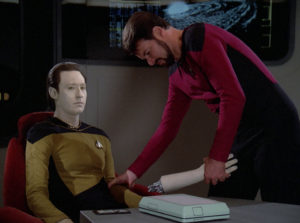 In each case, and in many other similar moments, Picard offers compassion where there was none. He looks through the bureaucratic red tape and sees the individual. He knows that even if he cannot understand the science or semantics of what makes someone who they are—android, Romulan, human or otherwise—that they were still lovingly and deliberately created. He knows that they aren’t the adjective that precedes them. They are not synthetic life or alien life. They are life, just like all others. Raise your hand if you think that’s something we need more of today.
In each case, and in many other similar moments, Picard offers compassion where there was none. He looks through the bureaucratic red tape and sees the individual. He knows that even if he cannot understand the science or semantics of what makes someone who they are—android, Romulan, human or otherwise—that they were still lovingly and deliberately created. He knows that they aren’t the adjective that precedes them. They are not synthetic life or alien life. They are life, just like all others. Raise your hand if you think that’s something we need more of today.
What Can Star Trek Teach Us Today?
Beloved, if God so loved us, we also ought to love one another.
—1 John 4:11
In “The Offspring,” Data names the daughter he created “Lal,” which means “beloved.” Thing is, Data is incapable of emotions and cannot love her; so he said. How could she be “beloved” by him?
Only through his actions toward her, gentle and intentional, parental and nurturing. He sees her individuality and fights for her rights when they are threatened. Because of this, she ultimately learns how to love, and shows it back to him (that’s a spoiler-free recap in case you haven’t seen it). She loves because he first loved her.
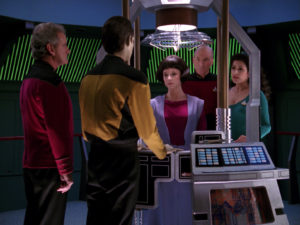 Just as a parent can teach a child how to love simply by loving them, scripture shows us that God’s perfect love for us teaches us what living a loving life truly means. Real compassion is an extension of the merciful nature of God. Star Trek gives us pictures of this compassion time and time again, and “Remembrance” may be one of its most poignant. Each new mission that treks across the stars seeks out new life, and declares it to be good. You know, with the occasional mishap or bad guy to outwit along the way.
Just as a parent can teach a child how to love simply by loving them, scripture shows us that God’s perfect love for us teaches us what living a loving life truly means. Real compassion is an extension of the merciful nature of God. Star Trek gives us pictures of this compassion time and time again, and “Remembrance” may be one of its most poignant. Each new mission that treks across the stars seeks out new life, and declares it to be good. You know, with the occasional mishap or bad guy to outwit along the way.
Jean-Luc Picard is the most natural embodiment of this mission. His compassion illustrates how we are called to treat others as Christians. Every single person you’ll ever meet is made in the image of God, no matter their race or religion or if they are comprised of synthetic parts. We are called to love them, and our actions will tell us if we are or not. Picard, both the man and the show, seem intent on setting a good example for us. It’s a bold frontier to explore, to be sure. But I think he’s the perfect captain for the job.
• • •
Craving more Star Trek content? We do a whole month on the franchise every September; click here to warp over to Trektember. And don’t forget to drop in next week for our review of Season 1, Episode 2.


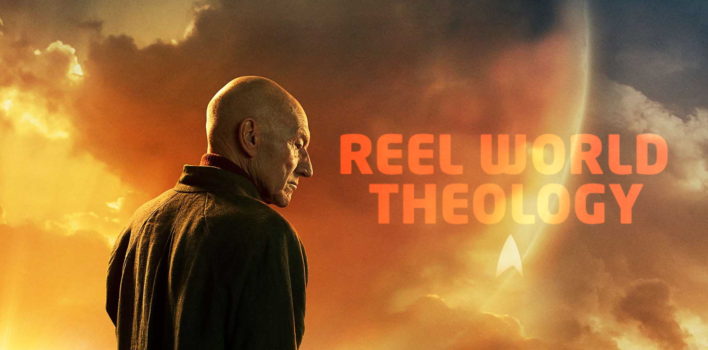
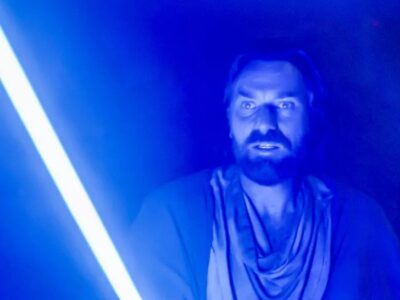
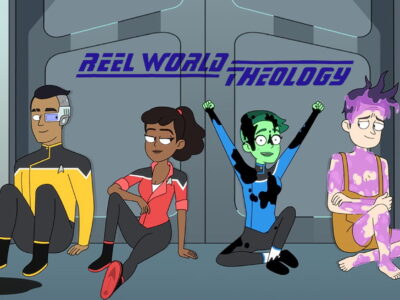
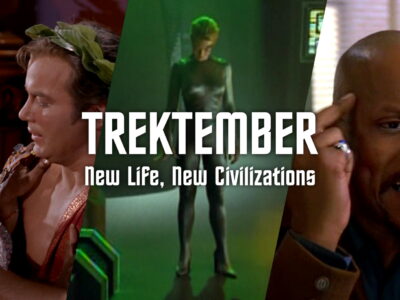


Pingback: “Maps and Legends” – Star Trek: Picard S1E02 | Reel World Theology
Pingback: “The End is the Beginning” – Star Trek: Picard S1E03 | Reel World Theology